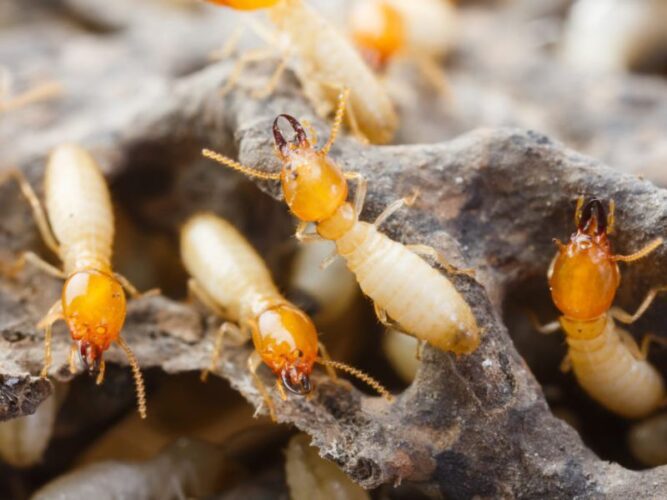Termites, often referred to as silent destroyers, can wreak havoc on homes and structures if left untreated. Their ability to cause extensive damage to wooden structures makes termite treatment essential for homeowners and property managers.
In this article, we will explore various termite treatment methods, their pros, and cons, and determine the most effective approach to combat these destructive pests.
What are Termites?
Termites are social insects that feed on cellulose-based materials, such as wood. They live in colonies and work together to consume and break down wooden structures, posing a threat to the integrity of buildings. Effective termite treatment is crucial in preventing costly damage and preserving the value of properties.
Definition of Termites
Before delving into termite treatment methods, it is essential to understand the nature of these pests. Termites belong to the order Isoptera and are classified into different species. The most common types of termites include subterranean termites, drywood termites, and dampwood termites. Each species has unique characteristics and requires tailored treatment approaches.
Importance of Termite Treatment
The significance of termite treatment cannot be overstated. Without proper intervention, termite infestations can compromise the structural integrity of buildings, leading to costly repairs. Timely treatment not only eliminates existing termite colonies but also serves as a preventive measure to deter future infestations.
Chemical Treatments
Chemical treatments are widely used to control termite infestations. These treatments involve the application of liquid termiticides or baits to targeted areas. The termiticides can either repel or kill termites upon contact, while bait systems attract termites to consume toxic substances and spread them within the colony.
Pros
- Highly effective in eliminating termite colonies.
- Extensive range of chemical products available.
- Long-lasting protection when applied correctly.
Cons
- Potential environmental impact due to the use of chemicals.
- Health risks if not handled and applied properly.
- Some termites may develop resistance over time.
Physical Barriers
Physical barriers are preventive measures used to create a barrier between termites and the structure they target. These barriers can be installed during construction or retrofitted to existing buildings. Common physical barriers include stainless steel mesh, sand barriers, and termite-resistant materials.
Pros
- Provides long-term protection.
- Environmentally friendly option.
- Minimal maintenance is required once installed.
Cons
- Initial cost can be higher compared to other methods.
- Installation may require professional assistance.
- Not effective against all termite species.
Biological Controls
Biological controls involve the use of natural predators or pathogens to control termite populations. Nematodes, fungi, and certain types of bacteria can be introduced into termite-infested areas to disrupt their reproductive cycle or cause mortality.
Pros
- Eco-friendly and non-toxic to humans.
- Target specific termite species.
- Can be used in combination with other methods.
Cons
- Effectiveness may vary depending on environmental conditions.
- Requires precise application and monitoring.
- May take longer to achieve desired results.
Integrated Pest Management (IPM)
Integrated Pest Management (IPM) is a holistic approach to termite control that combines multiple methods. It focuses on prevention, monitoring, and targeted treatment to minimize the use of chemical pesticides while ensuring effective termite management.
Natural Remedies
In addition to chemical and physical treatments, certain natural remedies can help repel or control termites. These remedies include the use of essential oils, such as orange oil or neem oil, which have termite-repellent properties. While natural remedies may have limited efficacy, they can be used as part of an integrated approach.
Prevention Methods
Prevention is key to minimizing the risk of termite infestations. Regular inspections, maintenance of proper drainage, and removal of wood debris near structures can significantly reduce the likelihood of termites establishing colonies.
Hiring a Professional
When faced with a severe termite infestation or when dealing with valuable properties, hiring a professional pest control company is advisable. Professionals have the knowledge, experience, and equipment to assess the situation accurately and apply appropriate treatment methods.
Factors to Consider
- Reputation and certifications of the pest control company.
- Experience in termite control.
- Use of eco-friendly and safe treatment options.
- Warranty and follow-up services provided.
DIY Termite Treatment
For minor termite issues or budget constraints, some individuals may choose to tackle termite treatment themselves. However, it is crucial to exercise caution and follow safety guidelines to protect both the property and personal well-being.
Safety Precautions
- Wear protective clothing, including gloves and masks.
- Use appropriate concentrations of chemicals.
- Follow instructions meticulously.
- Avoid potential hazards, such as electrical wiring.
Comparative Analysis
To determine the most effective termite treatment method, it is essential to compare the different approaches based on factors such as efficacy, cost-effectiveness, environmental impact, and long-term results.
Conclusion
Termite treatment is a critical aspect of protecting properties from the damaging effects of termite infestations. Depending on the specific circumstances, chemical treatments, physical barriers, biological controls, or a combination of methods may be the most effective approach.
Employing preventive measures and seeking professional assistance when necessary can ensure long-term termite management and peace of mind for homeowners.
FAQs
Q1: How long does termite treatment usually take?
Termite treatment duration depends on the extent of the infestation and the chosen treatment method. It can range from a few hours to several days.
Q2: Can I use natural remedies as the sole termite treatment method?
While natural remedies may provide some level of termite control, they are generally more effective when used in combination with other treatment methods.
Q3: Will termite treatment eliminate termites permanently?
Termite treatment can eliminate existing termite colonies, but new infestations may occur if preventive measures are not implemented.
Q4: How often should I schedule termite inspections?
Regular termite inspections are recommended at least once a year, although the frequency may vary depending on the region and the history of termite activity.
Q5: Is it possible to perform DIY termite treatment without professional assistance?
DIY termite treatment is possible for minor infestations, but it is important to follow safety precautions and consider seeking professional help for severe cases.

